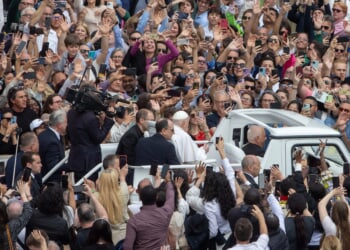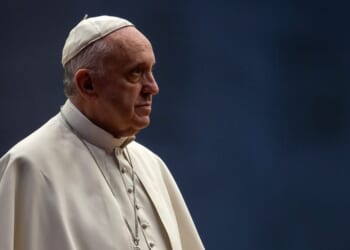Bryan Johnson, you know the name. He’s the oddball biohacker injecting his son’s plasma and monitoring his erections for the sake of “optimal longevity.” But now, Johnson, a weird mix of Michael Jackson and Mark Zuckerberg, has set his sights on something much bigger — much more, shall we say, heavenly. He’s no longer interested in just selling anti-aging routines or startup optimism. He’s currently selling salvation and calling it a religion. No, seriously.
“Dear humanity,” Johnson recently posted, “I am building a religion.” He didn’t blink. He wasn’t joking. He frames it as history’s next great ideology that will save the human race and “usher in an existence more spectacular than we can imagine.” In his cosmology, there are no angels, saints, or divine mysteries. There is only data. And, of course, him.
The gospel, if you can call it that, revolves around a single commandment: Don’t Die. It’s a phrase he repeats like a mantra, a dogma, a bumper sticker-like brand. And like any good prophet, Johnson is armed with a scripture. He boasts of synchronizing every cell with his ideology, monitoring organs, optimizing sleep, and rejecting ordinary human weakness. He doesn’t promise eternal life through God. Instead, he promises it through biometrics, spreadsheets, and full-body compliance.
All of this should worry anyone with a functioning brain.
What’s unfolding here isn’t just another techie wellness fad. It is, I suggest, a spiritual coup, a slow, seductive replacement of ancient human longing with algorithmic precision. In Johnson’s theology, there’s no place for mystery, grace, or imperfection. There is only control. He urges followers — now rebranded as “Don’t Die Citizens” — to download his app, track their vitals, and join his community. His utopia (or dystopia) is not about freedom. It’s about optimization. It’s about surrendering one’s body and soul to a biohacking blueprint.
This has all the hallmarks of a cult, headed by a guy wearing a Whoop band and a menacing grin. History warns us that cults rarely arrive with robes and rituals. They don’t start with Kool-Aid (some, however, do finish with the questionable beverage). They begin by offering answers. Then come the rules, the shared language, the isolation, and the branding of outsiders as unenlightened. Johnson’s world ticks every box. There’s the uniform: data trackers, blood tests, hyper-optimized routines. There’s the “holy” text. In this case, Johnson’s protocols.
Cults tend to offer hope in turbulent times. But their structure is always the same: a charismatic, guru-like leader, a rigid orthodoxy, and a promise too good to be true (and to question). Johnson’s promise is as old as sin itself: everlasting life is possible, but only one path delivers it.
But, one wonders, what is the cost of this promise? In Johnson’s world, death is not a teacher or a transition. It is the ultimate failure. Aging isn’t natural; it’s a disease to be eradicated. Suffering is not part of the human story. Rather, it’s bad code that needs to be rewritten.
At what point does wellness become tyranny? When it punishes deviation, deifies the self, and redefines morality around output and oxygen saturation. Johnson started off selling longevity. Now, he’s selling a new moral order, one where virtue is measured in resting heart rates and glycemic spikes, where your worth as a human is quantified and ranked. He’s selling people a world in which transcendence is not found in prayer but in perfect sleep hygiene, vegan diets, and the consumption of overpriced olive oil.
And like all cults, it doesn’t stop with the individual. It spreads. “Build your community,” Johnson urges. “Start your local Don’t Die group.” What begins as self-help metastasizes into social architecture, where body scans replace belief systems, and the question isn’t “What do you believe?” but “How optimized are you?”
If this is progress, count me out.
It’s tempting to laugh at a man who bathes in LED light, incessantly boasts about his erections, and has a peculiar fascination with rectums. But remember, every cult begins with mockery — until it becomes a movement. Johnson isn’t alone. He’s the tip of a spear aimed at a spiritually starved society desperate for direction. And he’s offering it, not in parables or poems, but in data points and downloadable diet plans.
That’s what makes “Don’t Die” so troubling. It’s not just a rejection of death. In many ways, it’s a rejection of everything that makes life human. In Johnson’s eyes, vulnerability, spontaneity, mystery, and failure are flaws to correct. In his warped vision, suffering is weakness, and unpredictability is a threat. But life without these things isn’t life. It is, I suggest, a simulation.
If we’re to reject anything, it’s not death. It’s the inhumane, joyless algorithm Johnson is selling. A life stripped of questions and wonder isn’t eternal. It is, in fact, entirely empty.
READ MORE:
The Fall of Harvard: How America’s Oldest University Became Its Most Expensive Liability


![NYC Tourist Helicopter Falls into Hudson River, Siemens Executive and Family Among Those Killed [WATCH]](https://www.right2024.com/wp-content/uploads/2025/04/NYC-Tourist-Helicopter-Falls-into-Hudson-River-Siemens-Executive-and-350x250.jpg)






![Red Sox Fan Makes the ‘Catch of the Day’ with Unconventional ‘Glove’ [WATCH]](https://www.right2024.com/wp-content/uploads/2025/04/Red-Sox-Fan-Makes-the-‘Catch-of-the-Day-with-350x250.jpg)
![Green Day’s Cringe Trump Diss Ends in Fire and Evacuation [WATCH]](https://www.right2024.com/wp-content/uploads/2025/04/Green-Days-Cringe-Trump-Diss-Ends-in-Fire-and-Evacuation-350x250.jpg)






